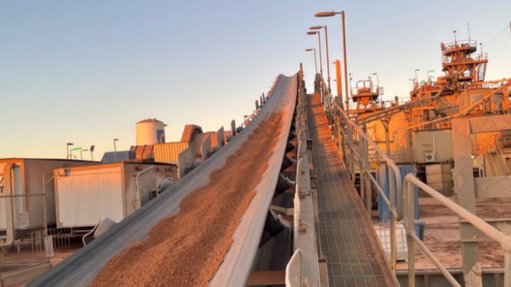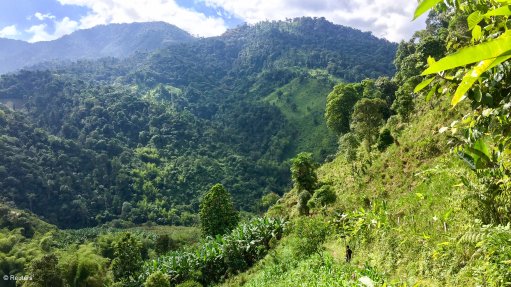Exploration, mining expected to grow in importance for cement producer PPC

PPC CEO Darryll Castle outlines the company's strategy to Martin Creamer
JOHANNESBURG (miningweekly.com) – The medium-term game plan of African cement producer PPC is to find new resources needed by its operations, which will probably require it to engage in some form of exploration and eventual mining close to where urban development is expected in Africa.
Over time, the resources side of the business is expected to become more critical as companies strive to optimise profits by minimising limestone variability.
“I think mining is going to become a key part of our arsenal, particularly understanding the orebody and how to mine it selectively,” PPC CEO Darryll Castle told Creamer Media in an exclusive interview. (Also watch video).
The JSE-listed PPC - which currently has nine cement factories in South Africa, Botswana, Zimbabwe and most recently Rwanda, which together have a production capacity of 8.6-million tonnes of cement products a year - already has a mining competence within its own mining department.
Mined materials including limestone, gypsum and coal are required in the production of cement and PPC’s target is to more than double the size of its business every ten years.
It is scheduled to open a cement plant in the Democratic Republic of Congo (DRC) before year-end and another in Ethiopia in the second calendar quarter of 2017.
Having served as a CEO of Trafigura Mining and Anvil Mining and COO of Metorex, Castle has extensive mining experience and will not shy away from mining, for example, a coal deposit if it happens to be right near where a company’s limestone deposit is located.
The company under his stewardship would be open to the possibility of mining the two together and even consider selling coal externally, if it made business sense.
Cement is fundamentally a limestone-based product and foremost in Africa is understanding where the market is, or will be in the future, and where the limestone is, along with sources of coal and gypsum.
While gypsum costs are quite a significant portion of PPC’s Rwanda cost base because of its having to be imported, its cost in the South African context is negligible because of local availability.
With logistics a significant portion of the cost base, the closer inputs are to the market, the better.
PPC’s target of more than doubling in size every ten years is based on the continent’s world-leading rate of urbanisation and the projection that the population of Africa will double by 2050.
Calculations point to Africa needing to accommodate another 900-million urban dwellers in the next 34 years and PPC foresees immense expenditure on infrastructure accompanying this significant urbanisation and population growth.
The company is leveraging off its South African domicile and skills base to focus far more strongly on Africa, for which it is tailoring competencies for each region entered.
It also regards indigenisation in all of its African businesses as a given.
Africa is seen as providing significant scope to broaden offerings considerably, even into retail. For example, transferring bagged cement to a warehouse in an urban environment bereft of retail infrastructure would put the company in a position to sell directly to the public, just as the operational need of cement plants to burn materials may present waste management opportunities.
“It’s no longer just about a cement volume expansion. There are related businesses that we’d look at as well, so doubling might mean different things to us than just pure cement volume doubling, but it tells you that we have to be working on a pipeline around new businesses, new cement factories in Africa, either leveraging off what we’ve got or finding new regions,” Castle commented.
The new head of the 124-year-old, 3 000-employee PPC, which has assets worth R20-billion, intends to position its cement factories close to the next African cities.
While its new $170-million 51%-owned 600 000 t/y cement plant in Rwanda ramps up, other projects that will help to add some 50% to South African volumes are:
• the $85-million, 700 000 t/y mill that PPC’s 70% Zimbabwean subsidiary is scheduled to commission at the end of this year;
• the large $280-million, 69%-owned cement project west of Kinshasa, in the Democratic Republic of Congo, which is scheduled to come on stream at the end of this year; and
• the new $170-million to $180-million 31%-owned cement project in Ethiopia, where work is scheduled for commissioning in the second calendar quarter of 2017.
PPC is also expanding its operations in existing markets and forming part of its channel management strategy for South Africa – where it also produces aggregates, metallurgical-grade lime, burnt dolomite and limestone – are the acquisitions of Safika Cement and Pronto Readymix, including Ulula Ash. The company also intends to conclude an asset-for-shares agreement with 3Q Mahuma to progress further the company’s ready mix channel management strategy.
It is keen to confirm that its first cement factory at Hercules, outside Pretoria – which was established in 1892 as De Eerste Cement Fabrieken Beperkt – was also Africa’s first cement factory.
“At some point, we had 100% market share in South Africa and we’ve spent 124 years slightly losing market share every year. What we want to do is regain some of that and we want to pick up in Africa.
“We believe we can be a pioneer in Africa in the way we were a pioneer in South Africa. For us, Africa is like a new dawn, much like South Africa was when the first factory was being built all those years ago,” Castle commented. (Also watch Creamer Media video).
Article Enquiry
Email Article
Save Article
Feedback
To advertise email advertising@creamermedia.co.za or click here
Press Office
Announcements
What's On
Subscribe to improve your user experience...
Option 1 (equivalent of R125 a month):
Receive a weekly copy of Creamer Media's Engineering News & Mining Weekly magazine
(print copy for those in South Africa and e-magazine for those outside of South Africa)
Receive daily email newsletters
Access to full search results
Access archive of magazine back copies
Access to Projects in Progress
Access to ONE Research Report of your choice in PDF format
Option 2 (equivalent of R375 a month):
All benefits from Option 1
PLUS
Access to Creamer Media's Research Channel Africa for ALL Research Reports, in PDF format, on various industrial and mining sectors
including Electricity; Water; Energy Transition; Hydrogen; Roads, Rail and Ports; Coal; Gold; Platinum; Battery Metals; etc.
Already a subscriber?
Forgotten your password?
Receive weekly copy of Creamer Media's Engineering News & Mining Weekly magazine (print copy for those in South Africa and e-magazine for those outside of South Africa)
➕
Recieve daily email newsletters
➕
Access to full search results
➕
Access archive of magazine back copies
➕
Access to Projects in Progress
➕
Access to ONE Research Report of your choice in PDF format
RESEARCH CHANNEL AFRICA
R4500 (equivalent of R375 a month)
SUBSCRIBEAll benefits from Option 1
➕
Access to Creamer Media's Research Channel Africa for ALL Research Reports on various industrial and mining sectors, in PDF format, including on:
Electricity
➕
Water
➕
Energy Transition
➕
Hydrogen
➕
Roads, Rail and Ports
➕
Coal
➕
Gold
➕
Platinum
➕
Battery Metals
➕
etc.
Receive all benefits from Option 1 or Option 2 delivered to numerous people at your company
➕
Multiple User names and Passwords for simultaneous log-ins
➕
Intranet integration access to all in your organisation



















